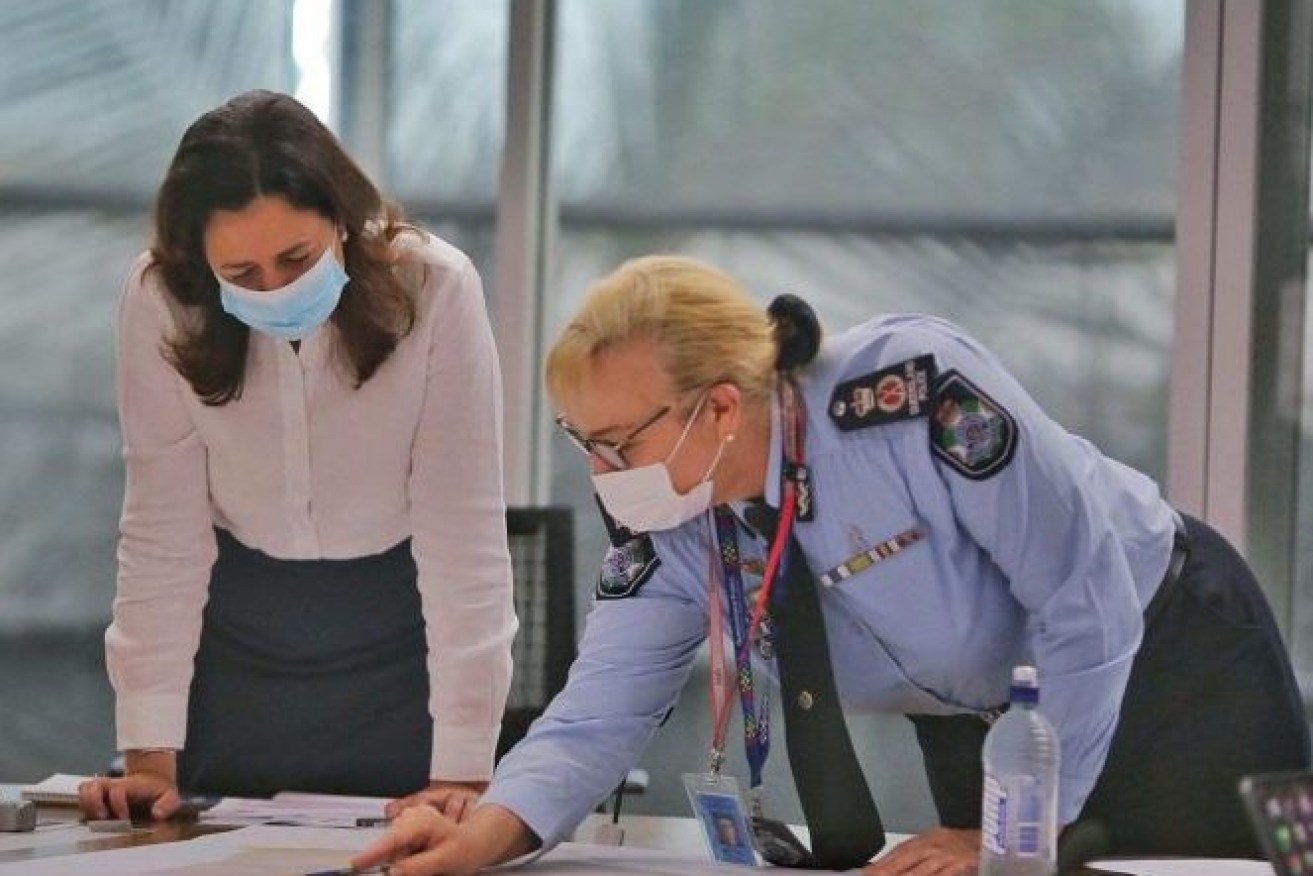Carroll’s final blow: Court says demand that police have Covid jab was ‘unlawful’
Directions mandating Queensland police be vaccinated during the COVID-19 pandemic have been ruled unlawful and did not give “proper consideration” to how it would impact their human rights, a judge has ruled.


Former Queensland Premier Annastacia Palaszczuk and ex-Queensland Police Commissioner Katarina Carroll wore masks during the Covid pandemic. (Image: AAP)
The Judicial Review follows Supreme Court actions launched in 2022 by dozens of Queensland police and Queensland Ambulance Service (QAS) staff who refused to abide by departmental directions they be vaccinated against COVID-19.
They faced suspension or the sack for failure to comply.
Brisbane Supreme Court Justice Glenn Martin, AM, today delivered his 115-page judgment ruling that directions by Queensland Police Commissioner Katarina Carroll in 2021 were unlawful.
The ruling also prevents both the Police Commissioner and Queensland Ambulance Service (QAS) rom taking any further action in relation to their mandatory vaccination directions. Both mandates have been lifted.
The court also found the directions limited the human rights of staff as it effectively meant they had to undergo a medical treatment (vaccination) without the employee’s full, free and informed consent.
But that limit was “reasonable in all the circumstances”.
The Judicial Review pertained to three decisions before the court – two were directions from Queensland Police Commissioner Katarina Carroll that each police officer and civilian staff had to be vaccinated against COVID-19.
The third decision involved a similar direction given to the QAS staff by then Director General Dr John Wakefield.
The emergency service staff’s court actions challenged the legality of the directions on a number of grounds including the Human Rights Act (HRA).
Justice Martin did find breaches under section 58 of the HRA which provides that “proper consideration” be given to identifying human rights impacted by decisions.
The emergency workers also challenged the legality of the directions under the Judicial Review Act however Justice Martin found they had not established any ground of “unreasonableness”.
He ruled Commissioner Katarina Carroll’s 2021 direction for mandatory Covid-19 jabs was unlawful as she has failed to properly consider the state’s Human Right laws.
Commissioner Carroll, who finishes up as the state’s top cop on Friday, directed that all QPS had to have at least one dose of the vaccination by October 4 2021 and a second dose two months later in December.
Exemptions for the vaccinations could be made for QPS staff could be made on the grounds of religious objections, exceptional circumstances and certain medical conditions.
The direction triggered action by sixty QPS civilian staff and police to the Queensland Industrial Relations Court (QIRC) in 2021.
On October 22, 2021 the full bench of the QIRC rejected submissions that Commissioner Carroll had no power to mandate compulsory vaccinations, did not consult staff and infringed upon workers’ rights.
Following the decision, the Commissioner issued a direction that all QPS employees be vaccinated by January 23, 2022, or face suspension without pay or dismissal. QAS staff faced a similar direction in January 2022.
Health and police employees both launched Supreme Court action for a judicial review of the decisions in 2022.
Carroll testified during the hearing.
In his judgment, Justice Martin said he was not satisfied the Commissioner had demonstrated she had given proper consideration to the human rights that might have been affected by her decisions.
He said the Commissioner’s evidence about when she considered aspects of human rights laws in relation to Compatibility Assessments and the vaccine mandates was “at best, inconclusive, and at worst, unreliable”.
He said he did not accept the Commissioner had considered whether her decision would be compatible with human rights.
“It follows that, by failing to give proper consideration, the making of each of those decisions was unlawful,’’ Justice Martin found.
Justice Martin noted that Dr Wakefield, “the decision-maker” for QAS did not give evidence.
“No attempt was made to demonstrate that he was unavailable to be called,’’ he wrote.
Dr Wakefield had submitted the QAS Direction mandating workers to have COVID-19 jabs was issued under an “implied term” of employment agreements where an employer can give employees lawful and reasonable directions.
Justice Martin found Dr Wakefield was unable to prove he had the power to issued the mandate under the implied term.
Justice Martin said both the QAS and QPS similarly argued the purpose of their vaccination mandates were to protect staff.
“Non-compliance with those directions could have had life-changing consequences for an employee who declined to comply with the direction.
“The balancing which needs to be undertaken with respect to those and the other matters referred to above is complicated by the fact that these directions were given in what was, by any measure, an emergency. It was further complicated by the fact that, at the time of giving the directions, the knowledge available about the virus, its variants, its virulence, and its transmissibility was limited and being added to on an almost daily basis,’’ he found.
In a statement, the QPS said it acknowledges the outcome of the Supreme Court Judicial Review regarding the Commissioner’s Directions.
“We will carefully consider the judgement and our options moving forward,’’ a spokesperson said.
Health Minister Shannon Fentiman told media in Cairns that the government were considering their position following the court’s ruling which she described as “technical”.
“I want to make it very very clear his honour did not find that mandated covid vaccinations were contrary to the human rights act…However the way the decisions were made in terms of the Queensland Police Service, it was found to be unlawful because the Commissioner did not give sufficient consideration to human rights when issuing the direction,” Ms Fentiman said.
She said the QAS was lawful and compatible with human rights legislation but there was insufficient evidence the director general had the power to make the direction.
Justice Martin requested all parties involved in the case submit their costs by the end of this week.












